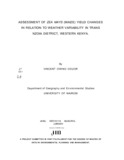| dc.description.abstract | Given the consensus of scientific evidence, the 21st century society will need to learn to mitigate, adopt and cope with accelerated weather variation and possibility of climate change. East Africa's livelihood systems, which are highly agricultural dependent, are likely to have to respond to climate variability and frequency of extreme events, including floods and drought. Thus, the first objective will be to understand the overall interactions between climate variability and yield responses. The study thus aimed at assessing maize yield changes in relation to weather variability in Trans Nzoia district, Rift Valley province of Kenya. This was due to the area being one of the leading zones in maize production in Kenya. The study made use of daily temperature and rainfall data from the Metrological station for the period 1985-1996 and agricultural data from Rift Valley Province annual agricultural reports from 1985 to 1996 The data was converted from daily readings to monthly and yearly means then subjected to several descriptive statistical techniques namely mean, standard deviation, variance, kurtosis, skew ness and time series analysis which revealed the occurrence oj maize yield changes and weather variation in the area of study. Rainfall showed a stronger relation to maize yield changes than temperature according to the regression and correlation analysis with a combination of both variables accounting to over 50% of the yields attained It was realized that there is a need to develop a regional climate change models that can be used to project country and provincial level climate change scenarios. The perspective deduced from the study was that a temperature increment of 1 degree Celsius for East Africa as projected by global climate change model will have little impact on maize yields in the highlands. This is due to the mean growing season temperature leveling at almost 18 degrees Celsius hence an increase of one degree will still be in the maize temperature threshold thus cause little or no impacts on maize yields in these regions. However, an accompanied change in rainfall will definitely cause a change in maize yields. | |

